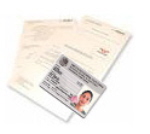Authenticating Documents: Notaries, Consulates, and Aposilles

This article was written by Jose Alejandro from Legal Corp:Personalized and Innovative Legal Consultant. There are three means of authenticating documents for Panama depending upon whether or not you are in Panama. These are the notary public, the Panamanian Consulate, and obtaining an Apostille.
If you are in Panama and you need to authenticate any documents, you need to go before a Notary Public. The notary will certify that the signatures in a document are authentic, that a document is a faithful copy of its original, or that the document was “given” before him as a sworn declaration of intention. You don’t have to make an appointment unless it’s a lengthy procedure like a Will or to give a sworn declaration. There are Notary Publics all around the country and you can use any of them, no matter where you live.
The Consulate
You use the consulate of a country only when you are abroad and a document has to be sent to the country that the Consulate represents. The Consul will authenticate your signature on the document. When that document gets to that country, the Consul’s signature must be authenticated by the Exterior Relations Office or its equivalent, to verify that it is valid and may be used for legal or official purposes. If you can’t find a Panamanian Consulate near you, you can mail the documents to the nearest one. But, Panama laws state that if you don’t have a Consulate near you, you can authenticate a document at the Consulate of a country that is friendly to Panama. The problem is that the term “friendly country” is not defined, so you might want to give the Consulate a call to see if they are friend or foe.
The Apostille
An Apostille is a means of legalizing documents not well known among U.S. or Canadian citizens. This procedure saves you a lot of time and money. The Apostille is an international form of authentication, given out by the Departments of State or Exterior Relations Departments of specific countries. Once you authenticate a document before the Notary Public, you take it to the Exterior Relations Office or equivalent and have it Apostilled. Once you have that seal, the document in question can circulate freely in any of the member States of The Hague Convention without going to any additional authority within the countries. So you don’t have to go through all of the requirements or procedures specified under the Consulate heading.
For a list of member States of the Hague Convention please go to
http://hcch.e-vision.nl/index_en.php?act=conventions.status&cid=41.
